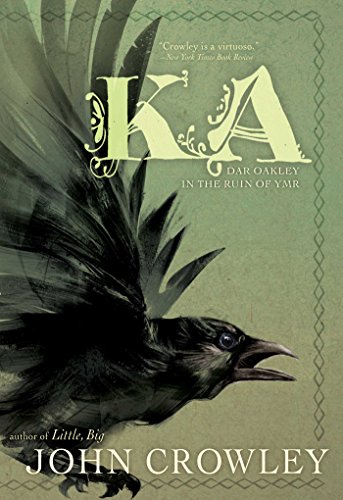![]() Ka: Dar Oakley in the Ruin of Ymr by John Crowley
Ka: Dar Oakley in the Ruin of Ymr by John Crowley
 Ka: Dar Oakley in the Ruin of Ymr (2017) is a brilliant novel. It is lovely, eerie, and heartachingly elegiac. It is also deeply weird.
Ka: Dar Oakley in the Ruin of Ymr (2017) is a brilliant novel. It is lovely, eerie, and heartachingly elegiac. It is also deeply weird.
I want the reader to understand me perfectly here. When I say “weird,” I do not mean it’s experimental, or iconoclastic, or that you’ll feel awkward explaining to your friends why you wanted to read a book about a magic bird. All of those things might be true (to greater or lesser degrees), but they feel trivial when applied to Ka. This book is weird, in both the new definitions and also the older sense that implies something like “uncanny.” The experience of reading this novel is like dreaming. There’s the sense of progression, of ordinary storylines going about their business, but there’s also a sense of unreality, of places where logic simply falls away into something hazy and inscrutable, and one is forced to feel rather than reason a way to grasp what the text is trying to convey.
I’m sure I’m making the book sound like a dreadful chore, but author John Crowley — who pulled the a similar trick (except perhaps even more so) in World Fantasy Award-winner Little, Big — manages to get away with his artistic choices, largely by being damn good at his craft. For readers familiar with Crowley, I hardly need to mention his pedigree, but for those who haven’t heard of him, he’s one of the best-regarded prose stylists in this language. At the very least, a reader coming into Ka is guaranteed some beautiful words.
Just to ground all of this, I should add that such a reader will also get a story about an immortal Crow (always capitalized in the book) named Dar Oakley who journeys into an Otherworld with a Bronze Age Welsh shaman and steals the secret to eternal life. Thereafter, he skirts the boundaries of the human world as it expands over the natural one, living different lives and different roles in medieval Europe, early America, the Civil War, and finally a gloomy version of a near future. His story is related via a frame narrative of an elderly man who claims to have found the crow sick and wounded and learned something of how to understand him, though he admits that maybe he’s only imagined it all.
Why the ambiguity, one asks? Crowley’s point is that it ultimately doesn’t matter — like many authors before him (perhaps as a result of what they do), his theme is the primacy of stories. Just as human personalities are composed of the stories we tell to ourselves and about ourselves, so is Dar Oakley a being made out of ideas. The notional realm — that Otherworld which Dar Oakley calls Ymr — is nothing more or less than the human imagination, and it is as real as we allow it to be.
Or maybe not. The trick of reading John Crowley is that he’s quite good at the art of presenting ideas without a definitive answer. In the titular “ruin of Ymr,” there’s definitely an element of the aging man disappointed by an imaginatively shallow era (whether that voice belongs more to the author or the narrator is up to the reader to decide), but there are also whispers here and there that it doesn’t do to become too caught up in dreams. As Dar Oakley’s experiences make him more and more like a human — abandoning the simple pragmatism of a Crow to embrace concepts like love, grief, and vengeance — his sadness seems to increase apace.
I loved this book for many reasons. The prose is haunting, Dar Oakley’s voice is strong and consistent, and the tone keeps with me like a catchy tune, coloring the way I view the world. That isn’t to say Ka is without flaw. Dar Oakley’s journeys are episodic, and some appeal more than others: the second narrative, in particular, loses some of the momentum built by a great opening act, and an Orpheus story midway through feels more like something Crowley really wanted to include than something native to the progression of events. There are also passages where Crowley’s love for dreaminess gets away from him, prompting a response (from me, anyway) that’s less “hmm… yes, I think I see… ” and more plain old “… huh?”
I seriously debated reducing the grade over these issues, and I still want to warn readers that this is not always an easy book. At the end of the day, though, I’m struck with the nagging sense that the book did exactly what Crowley wanted it to do, apparent weaknesses and all. And, well, it feels like a five star book. It lingers past the final page. Ka: Dar Oakley in the Ruin of Ymr may or may not be a flawed gem, but a gem it remains, seated among all the rhinestones and glass.
I read Ka: Dar Oakley in the Ruin of Ymr in both print and audio format (Brilliance Audio). Crowley narrates the audiobook edition himself, delivering a solid performance that sometimes led me to quicker comprehension of his themes. The audiobook is recommended, though I should point out that going with the audiobook will mean that the reader misses out on some excellent illustrations by Melody Newcomb in the print version.



Sold me. Thanks,